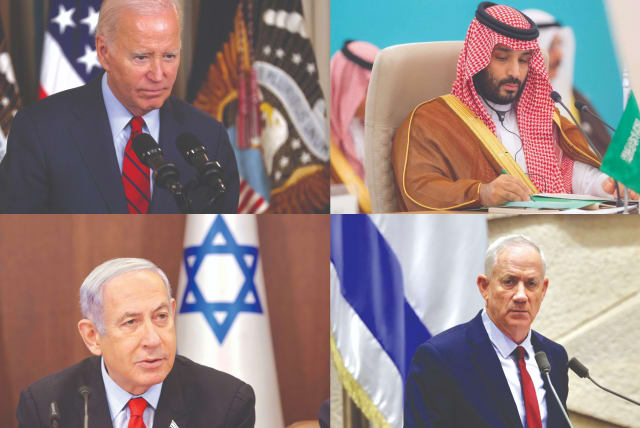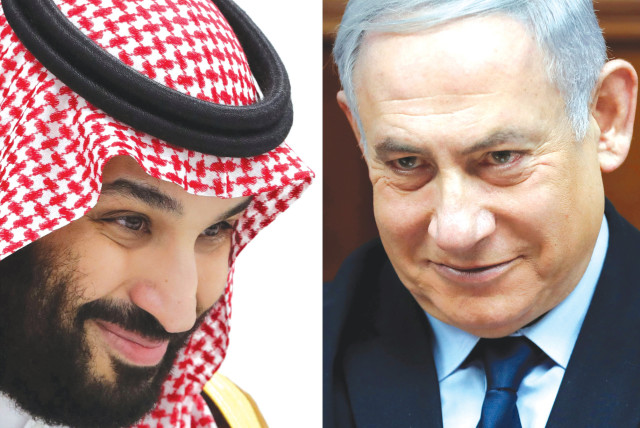Will Israel-Saudi normalization be announced this month?

DIPLOMATIC AFFAIRS: Mideast diplomatic breakthroughs tend to bloom in September. Will this hold true for Saudi-Israeli normalization?
Something about this time of year makes it an auspicious time for big regional peace moves.
Consider the following examples: The Camp David Accords between Egypt and Israel were signed on the White House lawn on September 17, 1978. The Oslo Accords were inked at the White House on September 13, 1993. And the Abraham Accords were formalized in Washington on September 15, 2020.
Taking the pattern further, Israel and Jordan signed their peace agreement in the Arava on October 26, 1994, and the Madrid Peace talks began on October 30, 1991.
That momentum is building toward a game-changing Israel-Saudi-US peace deal during this particular season offers a slight reason for optimism. But it will take much more than an auspicious seasonal aligning of the stars to turn this deal into reality. It will take considerable concessions from all sides involved.
Things are happening. There is a great deal of diplomatic motion, though it is unclear at this point if that motion will result in concrete movement forward.
What motion did we witness this week?
First, the formal nomination of Jack Lew as the US ambassador to Israel.
As a former White House chief of staff and Treasury secretary, Lew would be the highest-ranking former official ever to fill this position, bringing a certain heft to the role that may be necessary to convince Israel to make the concessions the US might feel Israel needs to make.
Second, separate conversations US Secretary of State Antony Blinken held this week with Prime Minister Benjamin Netanyahu and Palestinian Authority President Mahmoud Abbas to, among other things, discuss the Palestinian piece of this puzzle. Obviously, there is a significant Palestinian piece to this puzzle.
This leads to the third act of motion this week: the visit to Saudi Arabia by a high-level Palestinian delegation that included Abbas confidants Hussein al-Sheikh, Abbas’s deputy; Majed Faraj, the Palestinian intelligence chief; and Majdi Khaldi, Abbas’s diplomatic adviser. They met on Wednesday with Saudi national security adviser Musaed al-Aiban.
Those talks are significant because they represent a shift in Palestinian tactics. If, when negotiations were under way leading up to the Abraham Accords in 2020, the Palestinians – adamantly opposed to any normalization between the Gulf states and Israel – refused to engage with any of the sides, this time they are presenting the Saudis and the US with a list of their demands.
And this list is hefty. According to a BBC report, it includes Israel transferring parts of Area C to PA control; a “complete cessation” of settlement activity; the resumption of massive Saudi financial aid to the PA, which was stopped some three years ago; reopening the US Consulate in Jerusalem; and resuming US-brokered negotiations with Israel from the position where they left off in 2014 under then-secretary of state John Kerry.
The fourth evidence of motion on this track is a high-level US delegation’s visit to Saudi Arabia, including White House Middle East envoy Brett McGurk and Assistant Secretary of State for Near Eastern Affairs Barbara Leaf. They are to meet with the Palestinian delegation and Saudi officials, after which Leaf is scheduled to travel to Jordan and then to Israel next week.
While US National Security Advisor Jake Sullivan cautioned, after Blinken’s phone conversations with Netanyahu and Abbas, not to “expect any immediate announcement” about a deal, clearly there is considerable diplomatic activity around it.
Under the broad contours of the agreement that have leaked out, Israel and Saudi Arabia would sign a NATO-like defense treaty, the US would sell state-of-the-art weaponry to Saudi Arabia and assist in its development of a civilian nuclear program that would include the right to domestic uranium enrichment; the Saudis would normalize ties with Israel, help end the war in Yemen, and provide massive financial assistance to the Palestinians; Israel would put a cap on settlement activity and pledge not to annex Judea and Samaria.
In other words, as Israel sails next week toward a full-blown constitutional crisis where the government could conceivably say that it will not listen to the High Court of Justice if it strikes down recent Knesset legislation on the reasonableness standard, dramatic diplomatic motion is taking place that could be transformative. A lot of people are pinning a lot of hope on this happening. Here is a look at some of the interests of the main actors:
Prime Minister Benjamin Netanyahu
For Netanyahu, mired as he is in the judicial overhaul crisis, a deal now would be nothing less than a godsend. It would dramatically alter the domestic conversation, rescue his legacy threatened by the first nine months of his current government, and prove what he has long argued: peace with the Arab world is possible without full peace with the Palestinians.
Yet at what price? Is it worth Israel giving a green light to Saudi Arabia being allowed to enrich uranium on its own and develop a civil nuclear program? In recent weeks, several voices from the security establishment have been raised saying that as welcome as a peace agreement with the Saudis would be, Israel cannot agree to Saudi Arabia mastering the entire nuclear fuel cycle, which would trigger a nuclear race throughout the region.
Then there is the question of the concessions to the Palestinians. Even if Netanyahu would be willing to concede some of what the Palestinians are asking, neither the Religious Zionist Party of Bezalel Smotrich nor Itamar Ben-Gvir’s Otzma Yehudit would go along with it. Such a move would cost Netanyahu his government.
Then the question would become whether Benny Gantz or Yair Lapid would join a government under Netanyahu to secure the deal. If they would not, it could lead to new elections, which would only take place well into next year, further complicating matters because there is a time clock at work – the US presidential elections in November 2024.
For such a deal to be brokered, a framework would have to be finalized and agreed upon before the US elections. Why? Because only a Democratic president will be able to get buy-in from some Democratic legislators who would oppose US “gifts” to the Saudis, and from others who would want to see more far-reaching Israel concessions to the Palestinians.
A Republican president would certainly pursue this type of peace deal, but a Democratic Congress – with some citing Saudi human rights abuses, and others Israel’s policies in the territories – would be less likely to approve what it would cost the US.
Another clear thing is that any deal is unlikely given Israel’s current domestic chaos.
After 75 years, there are several reasons Arab countries are interested in ties with Israel, one of which is what a strong Israel brings to the table: stability (until recently), a strong, reliable military, and a robust, hi-tech-based economy.
Those are assets that the UAE, Bahrain and Morocco wanted to tap into, and which Saudi Arabia is keen on leveraging to its advantage.
Presently, however, Israel appears anything but stable; it is not even clear who has the final say, the courts or the parliament. The military is seen as not what it used to be, since it is no longer certain that everyone will show up to service when called; and the economy is neither as robust nor as attractive as it was a year ago.
Israel needs to put its house in order before this deal will ever come to fruition. The Saudis are not going to want to bury 100 years of ideological enmity to Zionism – with all the turmoil in the Muslim world that may bring in its wake – if it looks like Israel is teetering on the edge.
It is conceivable in this situation that Netanyahu might feel the need to unilaterally accept the judicial reform package floated this week just to end the instability dimming Israel’s appeal as an attractive partner.
President Joe Biden
Biden, too, is pinning hopes on being able to broker a deal. What does he stand to gain?
First, this would be a major geopolitical victory for the US and enhance US interests. That America’s main allies in the region – Israel and Saudi Arabia – do not cooperate has long made it more difficult for Washington to pursue its own regional goals.
Second, it would box out the Chinese, who – as evidenced by their role in brokering the Iranian-Saudi rapprochement – are gaining ground in the region at America’s expense.
Third, brokering a transformative Middle East peace deal on the eve of presidential elections could give Biden somewhat of a boost in the voting booths, though this should not be exaggerated, since Americans generally vote on domestic issues, not on foreign policy.
Saudi Crown Prince Mohammed bin Salman
Saudi interests in this deal are multifaceted. Among the most critical considerations for Riyadh is that such a deal would cement a security pact with the US at a time when it is having severe doubts about US commitments to its security.
On January 23, 1980, then-US president Jimmy Carter articulated what became known as the Carter Doctrine. In his State of the Union address that year, he said, “An attempt by any outside force to gain control of the Persian Gulf region will be regarded as an assault on the vital interests of the United States of America, and such an assault will be repelled by any means necessary, including military force.”
More than 40 years later, following Iranian-backed attacks on both Saudi and UAE targets in the Gulf, the Saudis are asking themselves whether this doctrine is still in force.
This type of agreement would make clear that it is.
Then there is the Iranian threat. Even though a Saudi ambassador arrived this week in Tehran, the hostility between the two countries is deep and broad. A US-sanctioned nuclear capacity, even if it is now only a civilian one, will make the Saudis more comfortable as the Iranian nuclear saga drags on.
Finally, in 2016 bin Salman put forward his plan for the kingdom called Vision 2030 aimed at modernizing the country, diversifying its oil-based economy, and turning it into a central global economic power. To be able to do that, it would be most beneficial to Saudi Arabia to tap into and have access to the vibrant, highly innovative, hi-tech Israeli economy. It serves Riyadh’s purposes. It also deprives the UAE, Saudi Arabia’s rival for economic dominance in the region, of cornering this lucrative market, along with Bahrain and Morocco.
A transformative Israel-Saudi-US deal is a monumental endeavor that will demand major concessions and careful navigation through domestic and international complexities. While September has proven an auspicious month for these types of developments in the past, history may provide a precedent, but definitely no guarantee.
Jerusalem Post Store
`; document.getElementById("linkPremium").innerHTML = cont; var divWithLink = document.getElementById("premium-link"); if (divWithLink !== null && divWithLink !== 'undefined') { divWithLink.style.border = "solid 1px #cb0f3e"; divWithLink.style.textAlign = "center"; divWithLink.style.marginBottom = "15px"; divWithLink.style.marginTop = "15px"; divWithLink.style.width = "100%"; divWithLink.style.backgroundColor = "#122952"; divWithLink.style.color = "#ffffff"; divWithLink.style.lineHeight = "1.5"; } } (function (v, i) { });

